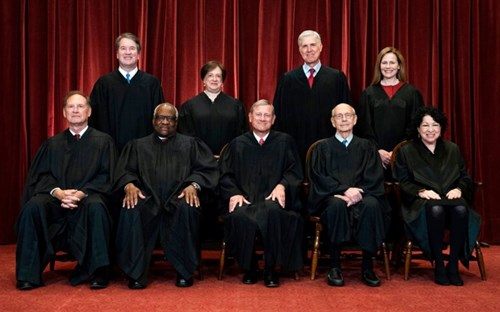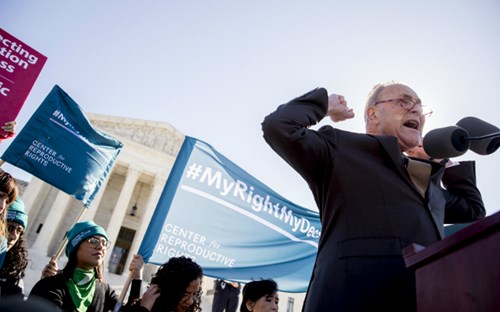The so-called reforms – intended to change the make-up of the right-leaning court – include term limits for justices, a code of ethics for members of the court, and adding seats to the nine-person court.
Kelly Shackelford, an attorney at First Liberty Institute, says the U.S. Constitution has mandates for the high court but leaves other decisions to Congress.
“Justices are chosen by the President and have to be confirmed by the Senate, and they get to serve for life. That's what's in the Constitution,” he advises.
 Making those changes requires a constitutional amendment, which is a long and difficult process on Capitol Hill. That process has happened only 27 times in more than 200 years and Shackleford predicts it would be hard – if not possible – to get done.
Making those changes requires a constitutional amendment, which is a long and difficult process on Capitol Hill. That process has happened only 27 times in more than 200 years and Shackleford predicts it would be hard – if not possible – to get done.
Other demands from Democrats, such as a code of ethics and adding more seats to the nine-seat court, would require a majority vote in the House and Senate to accomplish. So those controversial plans could depend on the November elections and who wins the White House.
Since it was established in 1789, the number of Supreme Court seats has ranged from five to ten justices, according to an article by Britannica.com. During a political fight with President Andrew Johnson, Congress passed legislation in 1866 to to decrease the number of seats from 10 to 7. In the 1940s, President Franklin Roosevelt attempted to appoint more justices when the court ruled against his New Deal legislation.
Left loses on guns, faith, affirmative action
Ever since Donald Trump's first term, the conservative-leaning U.S. Supreme Court has been an ongoing target of frustration – and hate – for Democrats after the court's political make-up changed.
 The court upheld the Second Amendment right to carry a firearm outside the home in its New York gun club case in 2022. A second ruling in 2022 upheld the free exercise of religion in Carson v. Makin, and a 2023 ruling on behalf of a Christian web designer did the same.
The court upheld the Second Amendment right to carry a firearm outside the home in its New York gun club case in 2022. A second ruling in 2022 upheld the free exercise of religion in Carson v. Makin, and a 2023 ruling on behalf of a Christian web designer did the same.
During that same 2023 term, the high court also upended race-based admissions at colleges and universities in a case brought by Asians who applied to attend Harvard University.
Those key rulings on firearms, faith, and race were nothing compared to the Dobbs ruling two years ago, when the court reversed Democrats’ revered Roe v Wade abortion ruling in a landmark decision.
Schumer directly threatened justices
That anger was demonstrated by Sen. Chuck Schumer, who was Senate Minority Leader in 2023. He delivered an unhinged speech (pictured below) outside the Supreme Court building when the justices were inside hearing oral arguments in the Dobbs decision.
“I want to tell you [Neil] Gorsuch. I want to tell you [Brett]Kavanaugh,” Schumer warned. “You have released the whirlwind and you will pay the price. You won’t know what hit you if you go forward with these awful decisions.”
 Schumer’s threating speech was condemned by the Democrat-friendly American Bar Association.
Schumer’s threating speech was condemned by the Democrat-friendly American Bar Association.
Schumer’s remarks also earned a rare public rebuke by Chief Justice John Roberts.
“Justices know that criticism comes with the territory,” the chief justice said in a statement. “But threatening statements of this sort from the highest levels of government are not only inappropriate, they are dangerous.”
A year after that incident, in March, Schumer and other Senate Democrats asked Roberts to meet with them to discuss judicial ethics and the high court.
“I must respectfully decline your request for a meeting,” Roberts, citing concerns over the separation of powers, wrote them in an official letter.

According to Shackelford, the push for changes is not about improving the judicial system.
“This is clearly not about some sort of principle,” he warns, “as much as it's about getting partisan results.”
Speaking in stark and ominous terms, Shackelford predicts the “country is over” if the nation’s highest court become another political body like Congress.
“People might think they have constitutional rights at that point,” he tells AFN. “They don't, because whatever rights they have can simply be wiped out by adding however many justices the political powers want to add to take that right away."







